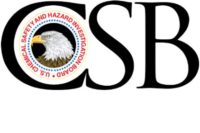Posted with permission from Confined Space, a newsletter of workplace safety and labor issues.
In a 3-1 vote, the Chemical Safety Board (CSB) voted yesterday to withdraw recommendations calling for the Bureau of Safety and Environmental Enforcement (BSEE) to strengthen worker participation requirements and to take measures to prohibit retaliation against workers who use their rights. Chair Vanessa Sutherland, joined by members Manny Ehrlich and Kristen Kulinowski voted to rescind the recommendations despite a spirited defense by Board member Rick Engler who voted to keep the recommendations.
As I reviewed last week, in April 2016 the CSB unanimously approved a 4-volume “Macondo Investigation Report” in response to the catastrophic Deepwater Horizon blowout that killed 11 workers, injured 17 and spilled 5 million barrels of oil into the Gulf of Mexico. The report contained a number of recommendations, including four recommendations calling for BSEE to significantly strengthen its regulations requiring worker participation in the employer’s safety program, and enhanced whistleblower protections for workers participating in safety activities. Last month, however, the CSB’s recommendations staff recommended that these recommendations be withdrawn in the face of opposition from BSEE, which claimed that it has no jurisdiction to adopt the CSB recommendations.
This is my first impression of the Board meeting after listening to the discussion in a noisy airport while waiting to see if my twice-delayed plane was going to take off (Spoiler alert: It finally took off. And landed.) I don’t have the official transcripts, only my aging memory and illegible notes to rely on. So forgive me if I haven’t reflected someone’s position completely accurately. Feel free to use the comment section.
The Board’s discussion yesterday focused on whether BSEE has authority to forbid retaliation, or whether it would better be placed at OSHA (or the Coast Guard) and whether Congress would be more appropriate to effect change than the CSB. This was progress from the October 16 meeting when the discussion revolved mostly around whether there was enough evidence in the report to justify the recommendations. Apparently, the Board members satisfied themselves that there was actually enough evidence of causation.
I discussed last week why it was obvious that BSEE has authority to require worker participation (because they already do it) and how it therefore makes little sense to say that they don’t have authority to protect workers from retaliation for using that authority. Nevertheless, three Board members seem to have just accepted BSEE’s doubt that they had such authority, even though Engler pointed out in his statement that
The technical term for words like “likely” and “not clear” is “weasel words.” And BSEE neglected to accompany that their statement with any kind of legal analysis. Nevertheless, three Board members were convinced.
Whistleblower Bill
Curiously, Board members used whistleblower legislation introduced last week (H.R.4304 – Offshore Oil and Gas Worker Whistleblower Protection Act of 2017) by Rep Mark Desaulnier (D-CA) to justify their withdrawal of the recommendations. DeSaulnier’s bill, if passed, would add whistleblower authority to the Department of Labor’s long list of whistleblower regulations that OSHA administers. Sutherland seemed to assume that because the bill would, if passed, give OSHA authority, that OSHA already has authority. While it’s true that the bill, if passed by the House and Senate and signed by the President, would have given that authority to the Department of Labor, the fact that a few members have introduced legislation does not determine any kind of current legal status.
Meanwhile, DeSaulnier sent a letter to Sutherland specifically asking her to vote against a change in the recommendations because “the recommendations…were essential for the future safety of workers on the Outer Continental Shelf and the environment.” DeSaulnier asked the CSB to amend the recommendations to direct it toward Congress because BSEE may not have the authority to provide full whistleblower protections on its own.
Necessary, But Not Sufficient
In my opinion, there is no doubt that legislation giving workers whistleblower rights is needed — along with strong remedies when those rights are violated. Nor is there any doubt that BSEE cannot provide remedies as strong as Congress can provide. Nevertheless, there is also no doubt in my mind that a strong BSEE regulation forbidding retaliation is also a necessary – if not sufficient – statement that would deter many employers from retaliating against workers.
The Board members who voted to withdraw the recommendations calling for stronger worker participation and protection against retaliation bent over backwards to emphasize that the withdrawal of those recommendations does not in any way signify that they are retreating from strong support for workers’ rights. And then they did backwards somersaults to congratulate themselves for speaking out so strongly for worker participation.
Rabble Rousing
My article last week also came under some not-so-subtle criticism from some Board members for allegedly attempting to incite the masses to put political pressure on the Board when such decisions need to be made by sober grown-ups using rational, evidence-based reasoning. And I apparently also implied that Board members who voted to withdraw the recommendations didn’t really care about worker participation.
Well, let me say this about that. All government agencies are supposed to act based on facts and evidence – whether by issuing regulations or recommendations. But the Administrative Procedures Act (APA) requires government agencies to take public comment before issuing – or repealing – regulations. Comments can be accepted from legal experts, scientific experts, as well as front-line experts – commonly known as workers or residents that may be impacted by an uncontrolled chemical release. A CSB recommendation may not technically fall under the APA, but the fact that worker advocates may want to weigh in on this decision — or on the importance of worker participation and strong CSB recommendations– is not illegitimate; it is the soul of good rulemaking … and good recommendations.
I can’t tell you how many times I watched OSHA change language in a proposed standard because workers or business owners presented information in hearings or written comments that had not occurred to OSHA staff. The CSB seems to recognize the importance of public comment in the open meetings it holds prior to issuing its final reports. But the decision to withdraw these recommendations was not subject to public comment (aside from 15 minutes at the October 16 meeting). So it’s a mystery to me why the idea of public comment from the unwashed masses (or from a blog post) was portrayed as an illegitimate intrusion into an otherwise fact-based and objective recommendations process.
Action Speaks Louder Than Words
I was also alleged to have implied that the Board members who voted to repeal the recommendations didn’t feel strongly about worker participation. Well, I don’t profess to know what’s in their hearts, so I will take them at their word that they care – they really care.
| The influence of the Chemical Safety Board is not based on the individual feelings or opinions of its members, but on the actions that the Board takes. |
But ultimately, it doesn’t matter what Board members truly care about in their hearts, or even what they say during these meetings. The influence of the Chemical Safety Board is not based on the individual feelings or opinions of its members, but on the actions that the Board takes. The Board has two unique ways to influence policy: reports based on strong evidence and findings, and recommendations to government agencies, industry associations and labor unions. Even when recommendations recipients don’t implement the recommendations, the change that the Board has advocated remains on the public agenda.
And despite expressed intent of Board members, or the backwards somersaults and self-congratulations for their verbal support of worker participation, withdrawing the recommendations sends a clear message to BSEE and the chemical industry that the CSB will no longer be a strong advocate for worker participation.
It also sends a strong message to government agencies that all they need to do when confronted with an uncomfortable CSB recommendation is weakly suggest that the agency doesn’t have the legal authority. The CSB will believe them and the recommendation will go away (or never even be issued) despite the fact that there may be no legal justification for the claim.
I hope I’m wrong and the CSB now adds a recommendation to Congress and then convinces an anti-worker Republican controlled House of Representatives and the equally anti-worker Republican controlled Senate to pass strong whistleblower and worker participation legislation that Donald Trump will sign.
But even if all of that happens, it still doesn’t excuse the unjustified withdrawal of important recommendations that could help prevent future catastrophic events.
In summary, there are words…and there is action. The words of the three Board members say one thing, but their action says another. And action speaks louder than words, to coin a phrase.
Click here to visit Confined Space.



